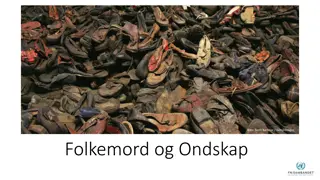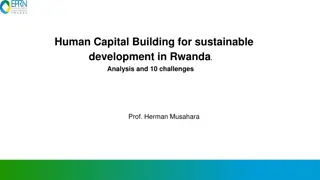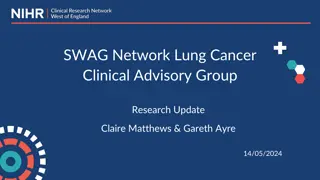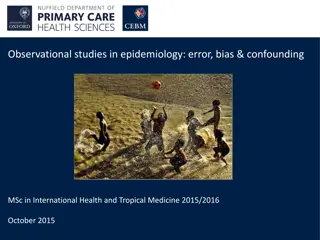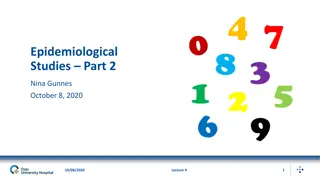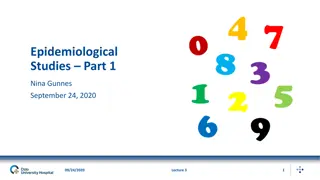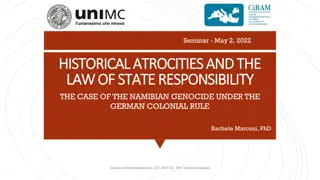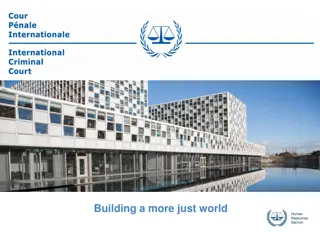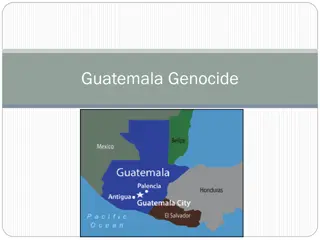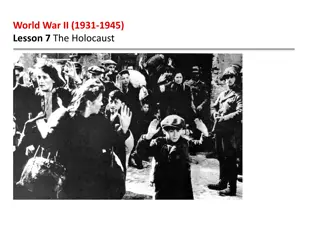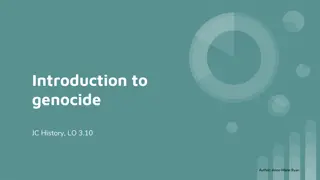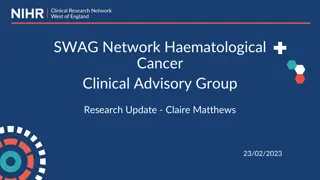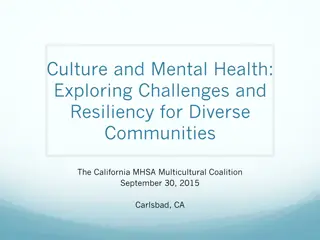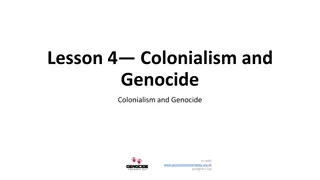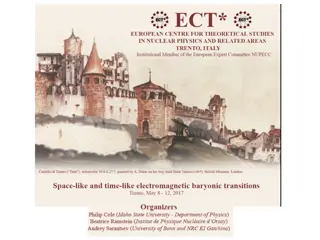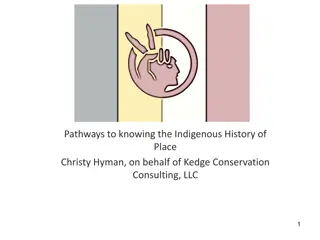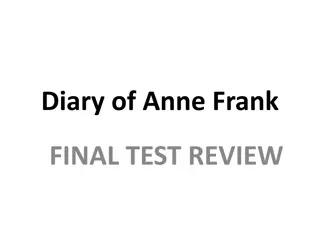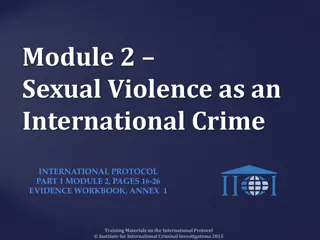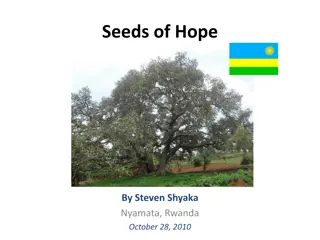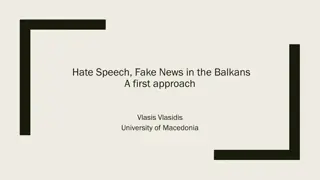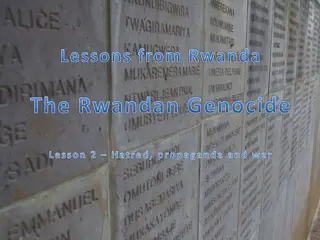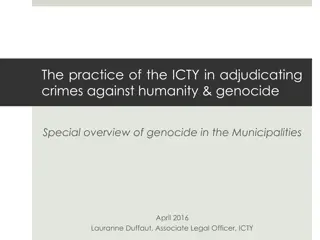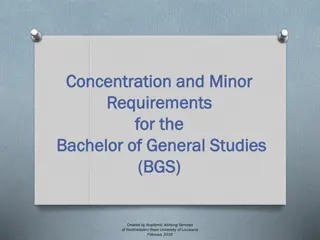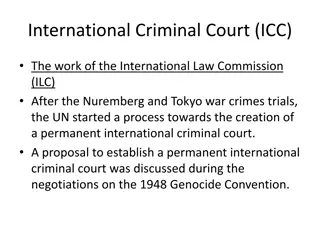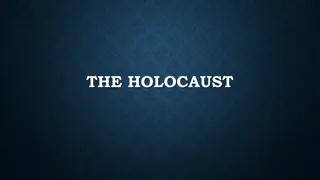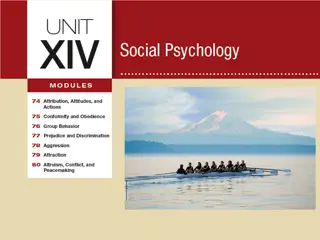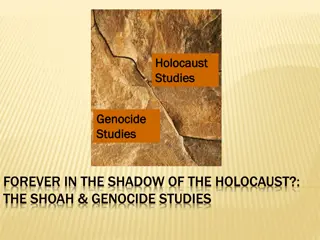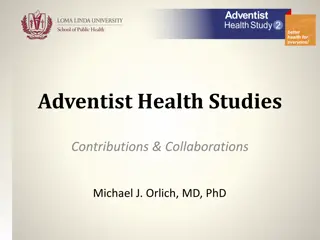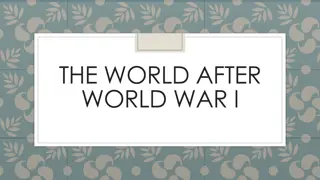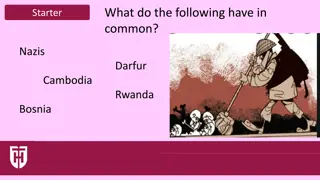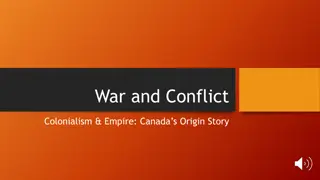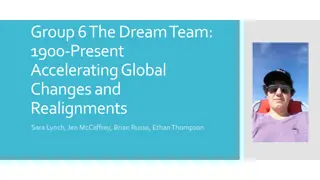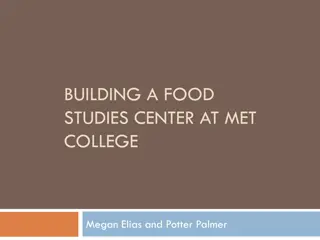Understanding Genocide: Connection Between Ethnic Cleansing and Evil
Explore the concept of genocide, as defined by the UN, through historical events like the Armenian Genocide and the Holocaust. Delve into the depths of evil and its association with acts of genocide within societies, touching upon the banality of evil and the systematic eradication of entire groups.
2 views • 10 slides
Human Capital Building for Sustainable Development in Rwanda: Analysis and 10 Challenges by Prof. Herman Musahara
This analysis by Prof. Herman Musahara delves into the significance of human capital building for economic growth and development, especially in post-pandemic recovery periods. It highlights Rwanda's strides in human development post-genocide while noting existing challenges like child stunting and
1 views • 24 slides
Remarkable Opportunities in Higher studies after Civil Engineering
Higher studies after Civil Engineering in Tamil Nadu\nCivil engineering stands at the forefront of shaping our physical environment; from the infrastructure we rely on daily to the sustainable development of our cities. Further, pursuing Higher studies after Civil Engineering opens up countless oppo
0 views • 2 slides
Latest Research and Studies on Lung Cancer - Update May 2024
This research update includes information on national recruitment to lung cancer studies, comparison of national vs. regional recruitment, and detailed descriptions of various studies and trials related to lung cancer. The studies cover areas such as treatment advancements, observational studies, ma
2 views • 13 slides
Understanding Observational Studies in Epidemiology
Delve into the realm of observational studies in epidemiology, exploring concepts such as error, bias, and confounding. Discover the significance of various study designs, from case reports to prospective cohort studies, in elucidating associations and establishing causality in non-communicable dise
0 views • 58 slides
Overview of Cohort Studies in Epidemiology
Cohort studies are a type of observational study where a group of healthy subjects is followed over time to investigate relationships between exposures and outcomes. They provide valuable insights into disease development and risk factors, offering advantages like assessing multiple exposures and en
0 views • 21 slides
Overview of Ecological Studies in Epidemiology
Ecological studies in epidemiology involve studying groups of individuals at a population level to examine the correlation between exposure and disease occurrence. While cost-effective and useful for generating hypotheses, ecological studies have limitations, such as the inability to control for con
3 views • 21 slides
Historical Atrocities and State Responsibility: Namibian Genocide Seminar
Explore the legal analysis of the Namibian Genocide under German colonial rule, focusing on international responsibility and reparations. Delve into the historical background, negotiations, and the 2021 Joint Declaration between Germany and Namibia regarding the atrocities. Understand the events fro
1 views • 23 slides
Overview of Media Studies Disciplines and Historical Development
Media studies is a multidisciplinary field that explores the content, history, and effects of various media, with roots in the relationship between media and culture. Originating in the 1920s, media studies draws on traditions from social sciences and humanities, incorporating theories from discipli
5 views • 18 slides
Understanding the International Criminal Court: Mission, Structure, and Impact
The International Criminal Court (ICC) was established in 2002 with the mission to end impunity for the most serious crimes affecting the global community. Through investigations, prosecutions, and trials, the ICC addresses crimes such as genocide, crimes against humanity, war crimes, and the crime
1 views • 22 slides
Understanding Clinical Trials: Types and Designs
Clinical trials are essential research studies that evaluate new tests and treatments to improve human health outcomes. They involve various phases, designs, and purposes, such as treatment trials, prevention trials, and observational studies. Different types of clinical trial designs include experi
7 views • 18 slides
Genocide in Guatemala: Tragic History and Pursuit of Justice
The Guatemala genocide, perpetrated by military dictator Rios Montt, inflicted horrific atrocities on the indigenous Ixil Mayans from 1982 to 1983. Massacres, torture, and displacement marked this dark chapter. Despite international condemnation and legal actions, justice remains elusive.
0 views • 7 slides
Understanding the Horrors of the Holocaust in World War II
Explore the dark period of World War II with a focus on the Holocaust, tracing its roots, progression, and impact. Delve into Hitler's campaign against the Jews, his final solution, and the establishment of Nazi death camps. Learn about the devastating consequences of genocide, the United States' re
0 views • 18 slides
Understanding Genocide in the 20th Century: Important Lessons and Research Tasks
Explore the concept of genocide through examples from the 20th century including Germany, Cambodia, Bosnia, Rwanda, and Armenia. Activities such as mapping genocides, researching case studies, and creating a timeline provide in-depth insights into this dark chapter of human history.
0 views • 10 slides
Hematological Cancer Clinical Studies Update and Recruitment Statistics
Latest update on hematological cancer clinical studies from the SWAG.Network Haematological Cancer Clinical Advisory Group, including national recruitment data, regional recruitment comparisons, open studies, and sample size information for ongoing studies. This comprehensive update covers a range o
0 views • 14 slides
Armenian Community in the United States: Challenges and Resiliency
The Armenian community in the US reflects a diverse background shaped by historical events like the Genocide. Despite facing challenges such as immigration waves and trauma, Armenian organizations strive to provide crucial services amidst growing population estimates. Key informants shed light on cu
0 views • 11 slides
Colonialism and Genocide: Impact of Divide and Rule in Rwanda
Colonialism in Rwanda exploited existing divisions between the Hutu and Tutsi, leading to heightened tensions and manipulation by the colonial government. This ultimately contributed to the genocide in Rwanda, which was not a sudden event but the culmination of years of historical tensions and explo
0 views • 12 slides
Advances in Baryon Spectroscopy and Hadronic Matter Studies
Discussions at the meeting focused on interpreting HADES results for e+e- and meson production in hadronic reactions, with studies involving proton, pion, light, and heavy ion beams. The role of time-like electromagnetic transitions, baryon spectroscopy, and connecting hadronic matter studies were e
0 views • 12 slides
Insights into Genocide and War Crimes in the Former Yugoslavia
Explore the harrowing events surrounding the genocide in Srebrenica, as well as the ICC statute defining genocide. Witness the testimonies of individuals like Drazen Erdemovic and Dragan Obrenovic, shedding light on the atrocities committed during the Yugoslav Wars. Delve into the plea of guilty, re
0 views • 31 slides
Understanding the Impacts of Colonialism on Indigenous Communities
The article delves into how East Coast Indigenous communities were profoundly affected during the colonial period and beyond, enduring forced removals, enslavement, attempted genocide, and subjugated statuses. It explores the historical realities that continue to shape the presence and representatio
0 views • 18 slides
Review of "Diary of Anne Frank" - Final Test Overview
In the final test review of "Diary of Anne Frank," key events are organized in chronological order, vocabulary related to the story is provided, and important themes such as persecution, genocide, and anti-Semitism are highlighted. The content explores the harrowing experiences of Anne Frank and her
0 views • 61 slides
Understanding International Crimes: Elements, Definitions, and Evidence
International crimes encompass acts like crimes against humanity, war crimes, and genocide, with various legal elements to establish accountability. To substantiate such crimes, individuals must prove contextual, linkage, and specific elements. Evidence of sexual violence is crucial in proving these
1 views • 20 slides
Survival and Resilience in Nyamata: Steven Shyaka's Story
Seeds of Hope captures Steven Shyaka's journey from a childhood plagued by the horrors of the Rwandan Genocide to his eventual rescue and recovery. Growing up in Nyamata, Rwanda, Steven faced the brutal consequences of the conflict firsthand, losing family members and enduring unimaginable trauma. T
0 views • 17 slides
Understanding Hate Speech and Fake News in the Balkans
This study delves into the prevalence of hate speech and fake news in the Balkans, shedding light on the harmful impact of such communication. It discusses the lack of an international legal definition for hate speech and explores how fake news spreads through fabricated stories, often disseminated
0 views • 27 slides
Lessons from Rwanda: Hatred, Propaganda, and War
Explore the dark era of the Rwandan Genocide, delving into the themes of hatred, propaganda, and warfare. Learn about the use of propaganda in influencing people and its impact during the conflict. Follow the timeline of events leading up to the genocide and the efforts for ceasefire amid escalating
0 views • 5 slides
Understanding Targeted Clinical Investigation in Pharmacovigilance
Targeted clinical investigation plays a crucial role in pharmacovigilance by further evaluating significant risks identified in pre-approval clinical trials. This involves conducting pharmacokinetic and pharmacodynamic studies, genetic testing, interaction studies, and large simplified trials to ass
0 views • 12 slides
Overview of ICTY's Adjudication of Crimes Against Humanity and Genocide
Explore the significant role of the International Criminal Tribunal for the former Yugoslavia (ICTY) in adjudicating crimes against humanity and genocide, focusing on the history, international crimes, specific trials, and achievements in bringing perpetrators to justice. The presentation provides i
0 views • 27 slides
Concentration and Minor Requirements for Bachelor of General Studies (BGS)
Bachelor of General Studies (BGS) students at Northwestern State University of Louisiana must complete a concentration consisting of 36 hours, with a minimum of 12 hours at the 3000 and 4000 levels taken at NSU. The popular concentrations are Social Science, Computer & Natural Science, and Arts & Co
0 views • 9 slides
Establishment of the International Criminal Court (ICC)
The International Criminal Court (ICC) was established following the Nuremberg and Tokyo war crimes trials, with discussions beginning during the negotiations on the 1948 Genocide Convention. The process culminated in the adoption of the ICC Statute in 1998, after much deliberation and compromise on
0 views • 16 slides
Understanding the Holocaust: History and Impact
The Holocaust was a horrific genocide orchestrated by Nazis and their collaborators with the aim of annihilating the Jewish people. It involved systematic mass murder, displacements, and destruction of lives during World War II. Anti-Semitism, World War I, and World War II were key factors leading t
0 views • 25 slides
Acts of Altruism & Social Response: Stories of Bravery and Indifference
In the midst of crisis, individuals like Carl Wilkens and Paul Rusesabagina displayed remarkable altruism by risking their lives to save others during the Rwandan genocide. On the other hand, the tragic case of Kitty Genovese highlights the bystander effect and the consequences of social apathy. Und
0 views • 47 slides
Exploring Pesticide Monitoring and Contamination Studies in Maine
Mary Tomlinson's work with the Maine Board of Pesticides Control includes past studies on groundwater and surface water monitoring, ongoing monitoring initiatives, and future collaborative studies. The State Law mandates residue surveys to identify possible contamination sources and develop a pestic
1 views • 55 slides
Forever in the Shadow of the Holocaust: The Shoah & Genocide Studies
Exploring the intertwined history of the Holocaust and genocide studies, this in-depth text delves into the etymology of genocide, the significant role of Raphael Lemkin, and the complex relationship between studying the Holocaust and other genocides. It discusses the nuances of comparing genocides
0 views • 17 slides
Adventist Health Studies Contributions & Collaborations Overview
Adventist Health Studies have made significant contributions to understanding the health and longevity advantages of Seventh-day Adventists, particularly focusing on vegetarian diets and cardiovascular health. With a history spanning over 57 years and various cohort studies, these studies have provi
0 views • 12 slides
The Impact of World War I and Its Aftermath
Explore the significant events post-World War I, including the fall of the Ottoman Empire, creation of new treaties, and the Sykes-Picot Agreement. Delve into learning objectives related to analyzing the world changes, the Armenian Genocide, and connections to ISIS. Reflect on the importance of Pale
0 views • 36 slides
Holocaust Memorial Day 2022: Remembering Genocides Across History
Holocaust Memorial Day, observed on 27th January, serves as a day of remembrance for the Holocaust, Nazi Persecution, and genocides in Cambodia, Rwanda, Bosnia, and Darfur. It aims to educate and honor the victims, highlighting the horrors of terrorism, persecution, and genocide inflicted on various
0 views • 22 slides
Unveiling Canada's Colonial Past: An Indigenist Lens on Settler-Colonialism and Empire
Delve into Canada's origin story through an Indigenist lens, exploring themes of colonialism, empire, and resistance. Uncover the myth-building supporting settler-colonization and the erasure of Indigenous peoples. Reflect on the controversial doctrine of discovery and the impact of the Indian Act i
0 views • 14 slides
The Holocaust: A Comprehensive Overview
The Holocaust was a tragic chapter in history where millions of Jews and other groups were targeted and persecuted by the Nazi regime during World War II. This summary covers key events such as the rise of the Nazi party, establishment of concentration camps, Nuremberg Laws, and the Final Solution.
0 views • 13 slides
Global Conflicts and Revolutions: A Historical Perspective
The turbulent events of the 20th and 21st centuries, from the aftermath of WWI with the Treaty of Versailles to the devastating Rwandan Genocide in 1994, have shaped our world through wars, genocides, and ideological clashes. The rise of leaders like Hitler, the tragedy of Pearl Harbor, the Korean W
0 views • 7 slides
Building a Food Studies Center at Met College
Establishing a Food Studies Center at Met College, driven by the merging of Food and Wine courses with Gastronomy programs, aims to integrate hands-on and academic approaches to food studies. Drawing inspiration from existing models like the Culinaria Research Centre and the Center for Regional Agri
2 views • 8 slides
